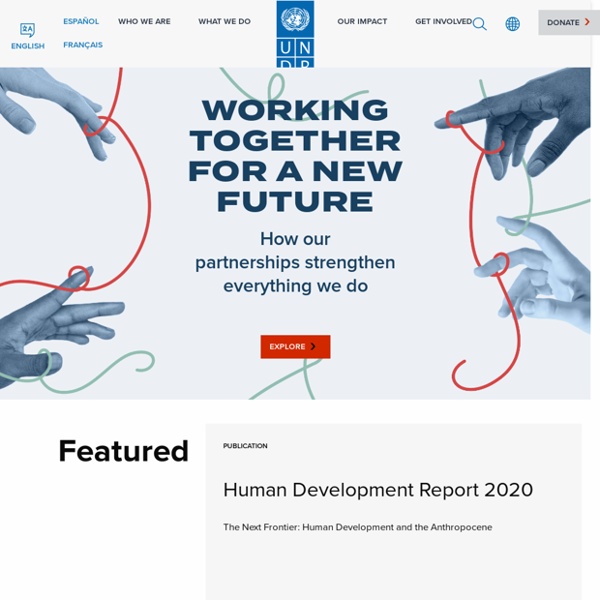



https://www.undp.org/content/undp/en/home.html
Related: Sustainability • MiljöAssess the U.S. Climate Scientific assessments are essential tools for linking science and decision making. They survey and synthesize science, within and between disciplines and across sectors and regions. They highlight key knowledge that can improve policy choices and identify significant gaps that can limit effective decision making. UNESCO Culture and development Measuring how culture contributes to economic development The Hangzhou Declaration of May 2013 was a key step in UNESCO’s advocacy for the role of culture in sustainable development. In this context, understanding the contribution of cultural employment to the economy is vital.
The Earth Institute - Columbia University Exploring Science in the Field from Pole to Pole Company Donates 330,000 Bed Nets to Help Fight Malaria in Africa Lords of the Past Ancient Rocks, Modern Problem World Development Indicators The primary World Bank collection of development indicators, compiled from officially-recognized international sources. It presents the most current and accurate global development data available, and includes national, regional and global estimates. TypeTime seriesPeriodicityAnnualLast Updated01-Feb-2017Economy CoverageWLD, EAP, ECA, LAC, MNA, SAS, SSA, HIC, LMY, IBRD, IDAGranularityNational, RegionalNumber of Economies217TopicAgriculture & Rural Development, Aid Effectiveness, Climate Change, Economy & Growth, Education, Energy & Mining, Environment, External Debt, Financial Sector, Gender, Health, Infrastructure, Labor & Social Protection, Poverty, Private Sector, Public Sector, Science & Technology, Social Development, Trade, Urban DevelopmentUpdate FrequencyQuarterlyUpdate ScheduleApril, July, September, DecemberContact Detailsdata@worldbank.orgAccess OptionsAPI, Bulk download, Mobile app, Query toolAttribution/citationWorld Development Indicators, The World BankCoverage1960 - 2016
Project on Climate Change Communication April 09 2014 | Research Reports New Commentary Urges Climate Scientists to “Set the Record Straight” We just published a commentary in Earth’s Future, a new online, open-access journal published by the American Geophysical Union. The commentary is entitled: “Climate Scientists Need to Set the Record Straight: There is a scientific consensus that human-caused climate change is happening.” In the commentary, we argue that the climate science community needs to do more to communicate the scientific consensus because: (a) most Americans don’t know there is a scientific consensus on this point; (b) this lack of awareness undermines people’s engagement in the issue; and (c) research by our team – and others – has shown that simple messages that communicate this basic scientific conclusion are highly effective, especially with political conservatives.
Global Economic Prospects Source: World Bank. Notes: e = estimate; f = forecast. EMDE = emerging market and developing economy. World Bank forecasts are frequently updated based on new inform... Notes: e = estimate; f = forecast. Climate Change Proceedings: Proceedings published by the National Academies of Sciences, Engineering, and Medicine chronicle the presentations and discussions at a workshop, symposium, or other event convened by the National Academies. The statements and opinions contained in proceedings are those of the participants and are not endorsed by other participants, the planning committee, or the National Academies. Consensus Study Reports: Consensus Study Reports published by the National Academies of Sciences, Engineering, and Medicine document the evidence-based consensus on the study’s statement of task by an authoring committee of experts. Reports typically include findings, conclusions, and recommendations based on information gathered by the committee and the committee’s deliberations. Each report has been subjected to a rigorous and independent peer-review process and it represents the position of the National Academies on the statement of task.
Welcome - Steve Schein Dr. Steve Schein is a corporate sustainability strategist and family business advisor at L4S Consulting. He is a certified public accountant (CPA) and former CEO with more than 35 years of leadership, business development, consulting, and senior management experience in a wide range of industries. His primary areas of consulting are leadership development and integration sustainability with strategy and culture. Steve is passionate about helping leaders and teams tap into their deeper motivations and strengths to cultivate sustainable organizations over the long-term. His 2015 book A New Psychology for Sustainability Leadership: The Hidden Power of Ecological Worldviews has been featured in US News & World Report, The Guardian, Bloomberg News, Psychology Today and numerous other journals and publications.